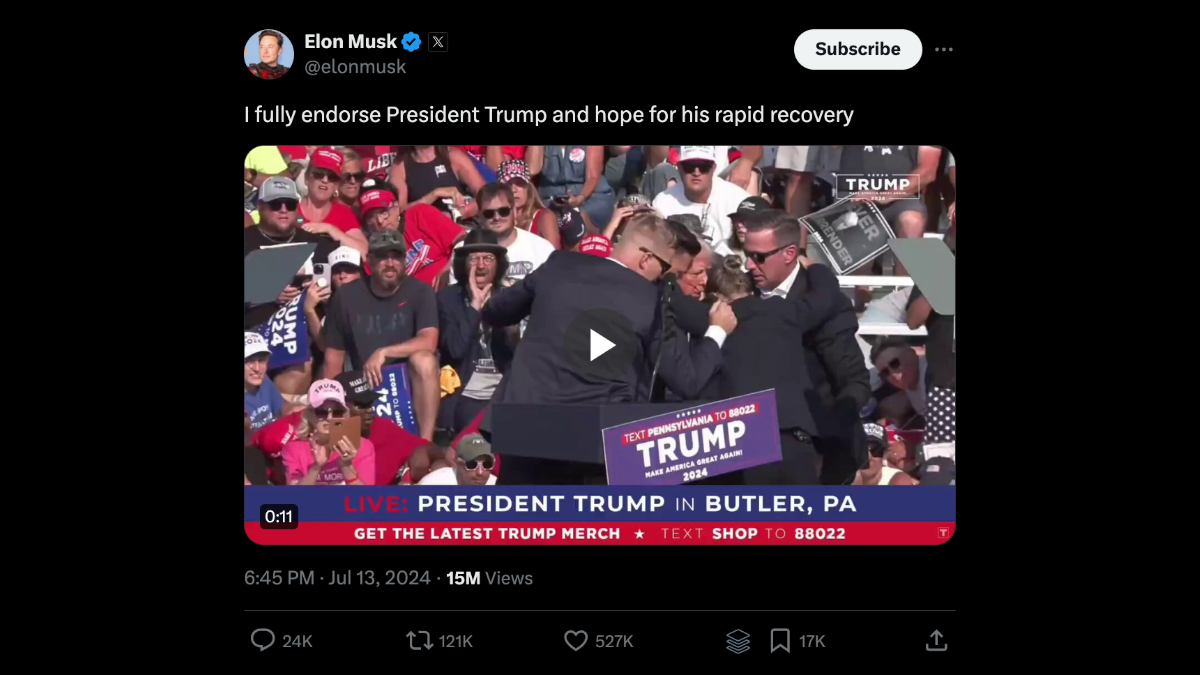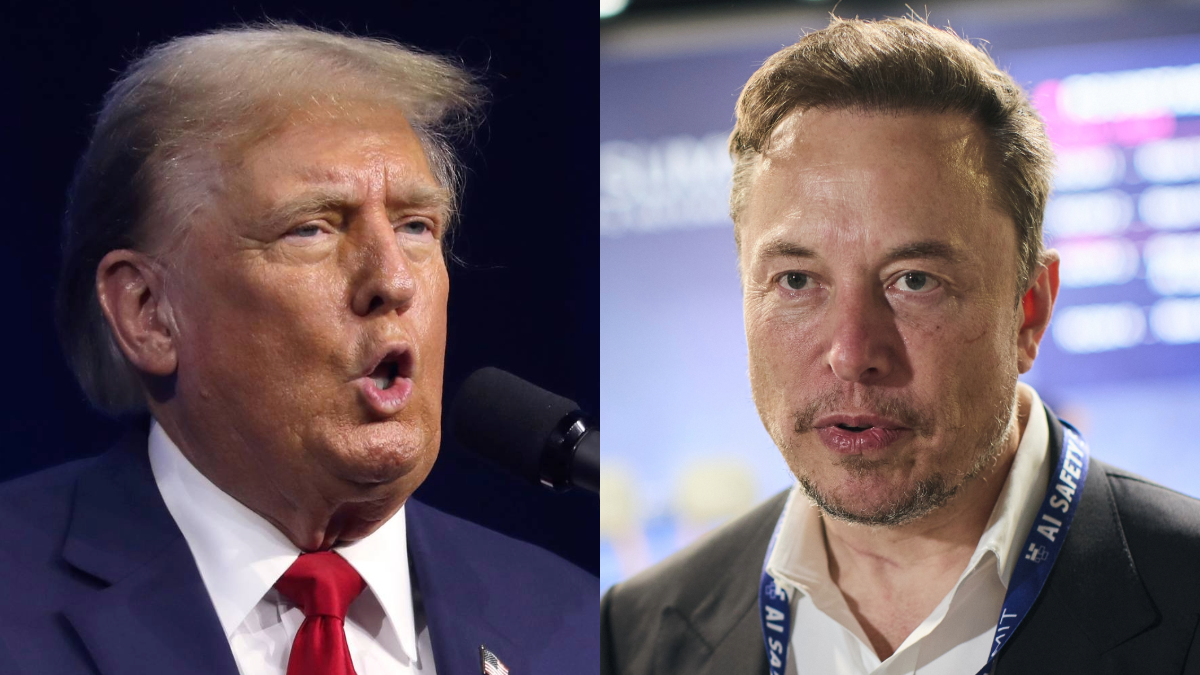Musk’s Endorsement of Trump Suggests X Won't Remain "Politically Neutral"
Gabby Miller / Jul 18, 2024Over the weekend, an assassination attempt on former President and 2024 Republican nominee Donald Trump at a deadly campaign rally in Pennsylvania prompted viral imagery on social media, including images depicting a bloodied Trump being whisked away by secret service with his fist raised. But as Americans attempted to make sense of the violence, conspiracy theories and mis- and disinformation took hold on social media platforms, which will continue to be faced with making high-stakes content moderation decisions leading into the US presidential election in November.
Minutes after the shots rang out, X’s billionaire owner Elon Musk endorsed Trump “fully” in a post on his platform, wishing him a rapid recovery. Shortly thereafter, Musk embraced the pro-Trump conspiratorial framing that the event was a possible Secret Service inside job and called X “the voice of the people” amid widespread rumors of media hesitancy to call the event an assassination attempt, as documented by the Center for an Informed Public at the University of Washington in rapid research published Tuesday.

A post on X by its owner, Elon Musk. Source.
But it appears Musk intends to do much more than post on Trump’s behalf. On Monday, The New York Times revealed that Musk helped start a new pro-Trump political action committee, called America PAC, alongside several of his wealthy tech entrepreneur friends. He pledged to give $45 million each month to the super PAC, according to additional reporting by the Wall Street Journal.
Yet Musk maintains that his platform, which he purchased for $44 billion in May 2023, will remain “politically neutral” in order to maintain public trust, even as he uses it to amplify his own political views. His purported commitment to neutrality was initially made during the transfer of ownership, when Musk’s first orders of business were laying off thousands of employees, shrinking X’s ‘trust and safety’ teams, and dissolving its Trust and Safety Council. This independent advisory group had helped the platform address issues like hate speech. There were a series of other high-profile departures amid the chaos, including Twitter’s former head of Trust and Safety, Yoel Roth, who faced a targeted harassment campaign following his exit at the behest of Elon Musk himself.
A Tech Policy Press/YouGov poll conducted before Musk’s endorsement shows a potentially different snapshot of how US voters are assessing the political leanings of major social media platforms like X, YouTube, Facebook, and TikTok. Despite both Republicans and Democrats accusing social media companies of demonstrating bias and censoring political content they disagree with, the poll suggests that many respondents still perceive platforms as relatively “neutral” entities. For instance, a quarter of all respondents believe the platform is politically neutral. While respondents’ own political leaning didn’t significantly impact how they viewed X’s politics, Republican and Republican-leaning respondents were almost twice as likely (31%) to view X as neutral compared to their Democratic and Democratic-leaning counterparts (16%). The online poll of 1,068 voters was conducted between July 11 and July 12, 2024.
Related Reading:
- Poll Finds Widespread Distrust of Social Media in US Election Cycle
- Poll Finds Support for US Surgeon General Warning Label for Social Media
David Karpf, an associate professor in the School of Media and Public Affairs at George Washington University, believes that some survey respondents are likely being strategic in their answers by saying what they want to see reported. “If there are conservatives on X who really like being on X now because of what they get to see, when asked in a survey, ‘Do you think X is conservative?’ they say no,’” Karpf said.
This speaks to how X has evolved politically, particularly under Musk’s ownership. Both Karpf and Jon Lewis, a research fellow at George Washington University’s Program on Extremism, understand the platform to be now nearly indistinguishable in its orientation from Gab, an “alternative” social media platform favored by the alt-right and neo-Nazis. While Gab remains relatively small, Musk purchased the scale needed to facilitate the spread of similar ideas, Karpf said. “X is degrading, but there’s still an awful lot of people there.”
Lewis similarly believes that Musk bought X, at least in part, as a way to turn a massive social media platform into an extension of his worldview. He observed that in nearly every single major flashpoint event of the last couple of years, right up until this weekend’s assassination attempt, X has become a hotbed for conspiracies and the kinds of white supremacist and anti-Semitic narratives that have taken hold on social media. “We saw massive influence and grifter accounts quick and very willing to promote the most absurd, quickly discredited conspiracies that are designed to get traction on Elon Musk’s platform,” Lewis said.
Daniel Kreiss, a professor and researcher in the Center for Information, Technology, and Public Life at the University of North Carolina Chapel Hill, says Musk has already effectively biased the platform in favor of right-wing interests. “The relevant questions are what firewalls does Twitter have in place to ensure that there are a broad set of policies to treat both candidates equally,” he told Tech Policy Press. “But in essence, pulling the plug on anything that is designed to limit racist posts or other things that used to fall outside of the policy puts the thumb on the scale for more right-wing actors.”
It then becomes difficult to disentangle the design choices Musk is making at X with the way he and other influencers are leveraging the platform to benefit from attention dynamics that privilege the sensational and generate outrage, according to Kate Starbird, associate professor at the University of Washington, in a press briefing on Tuesday. “We know that when [Musk] participates, that creates massive visibility for the ideas that he has and his opinions, and certainly [X] has become [a platform] where he has an outsized voice, not just directly, but also indirectly for people that share his ideology,” Starbird said. In other words, Musk doesn’t need to change the code underlying the platform to shape political conversations.
Starbird also agrees that X still remains somewhat at the center of the digital information ecosystem, but it’s hard to say for certain because researchers don’t have the same access to X’s data as in the past. (Just last week, the European Commission found X in breach of the Digital Services Act, which requires designated platforms to provide researchers with independent access to public data. X is charging for API access, starting at $42,000.)
For Lewis, the answer to many of these problems is better content moderation, yet social media platforms lack the willpower and are failing to pay “even the most basic lip service to stop domestic terrorism on their platforms.” The government’s reluctance to be seen as policing speech has left these decisions wholly to the platforms; in this gap, the platforms are “time and time again” refusing to tamp down on QAnon conspiracy theories and COVID disinformation because it’s hard and consequential, he said.
Karpf understands the tech billionaire class’ increasing politicization, including Musk’s open endorsement of Trump, “largely as a reaction to only a recently competent regulatory state.” After growing their companies in an “empty regulatory environment” that rewarded a “fake it until you make it” ethos, Karpf says powerful tech entrepreneurs have realized the wealth at stake depending on who sits in the oval office. Now, Musk sits at the helm of one of the most powerful social media companies ahead of a presidential election, where he stands to lose billions if the outcome is counter to his interests.
And there are broader questions about how Musk may direct the platform to respond if, as in 2020, Republicans choose to contest the outcome of the election with violence. While the most recent Tech Policy Press/YouGov poll found that a majority of respondents across parties believe that platforms have a duty to share signals about potential civil unrest with the public and with law enforcement, it is unclear what steps X would take to do so given Musk may potentially agree with his fellow Trump supporters. Ahead of the Jan. 6, 2021 insurrection on Capitol Hill, Donald Trump’s messages on Twitter galvanized his supporters to come to Washington, DC for an event he promised would be “wild.” Following the violence that day, then Twitter CEO Jack Dorsey decided to suspend Trump’s account, a decision Musk reversed, calling it a “grave mistake.”
Authors

